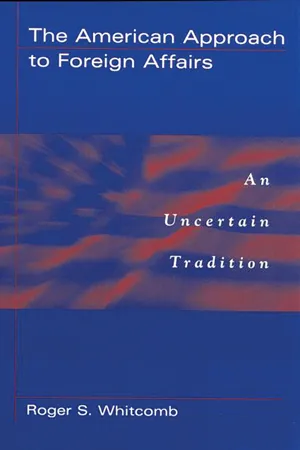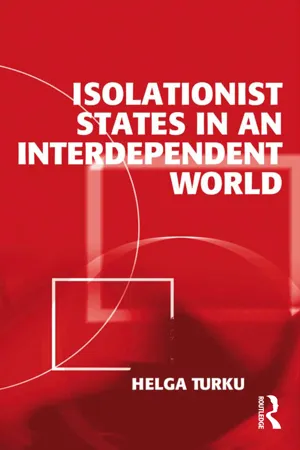Politics & International Relations
Isolationism
Isolationism is a foreign policy approach that emphasizes a country's independence and self-reliance, while avoiding alliances and involvement in international affairs. It is characterized by a reluctance to engage in international conflicts or to intervene in the affairs of other nations. Isolationism has been a prominent feature of American foreign policy at various times in history.
Written by Perlego with AI-assistance
Related key terms
1 of 5
2 Key excerpts on "Isolationism"
- eBook - PDF
The American Approach to Foreign Affairs
An Uncertain Tradition
- Roger S. Whitcomb(Author)
- 2001(Publication Date)
- Praeger(Publisher)
Today, of course, the world is not as far away as it once was; The Isolationist-Interventionist Impulse 85 still, the immediacy of international affairs is rarely as great for most Americans as that of local, state, or national ones—except, that is, in moments of perceived crisis. 5 Another component of the isolationist credo was an insistence upon America's non-involvement in foreign wars. America's eagerness to avoid such conflicts was no mere abstraction emanating from the mouths of the country's Founding Fathers. It was a resolve that developed from the American people's experience during the colonial period and the early years under the Constitution. Between 1689 and 1815 England and France went to war seven times, fighting each other for almost half of that 126 year period. Americans were involved in some fashion or other in every one of these conflict situations, regardless of their own desires in the matter. Is it any wonder that in the years leading up to the American Revolution the benefits to be had from non involvement in Europe's wars were seen as one of the main benefits of "separation" from England. 6 The fear of unwanted involvement in foreign wars not of our own making was the major contributing factor to perhaps the most widely recognized definition of Isolationism in American history: the idea of diplomatic and military non-entanglement. From the Washington administration down to the Second World War, the view that America, for security purposes, must remain free from complicating commitments to the Old World was a hallowed viewpoint for most Americans. The injunction against entangling alliances came over time to be universalized and sanctified into a kind of rule. It is also in this particular guise that the isolationist impulse should be seen as an attempt to preserve the national sovereignty of America, including its independence in policy-making. - eBook - ePub
- Helga Turku(Author)
- 2016(Publication Date)
- Routledge(Publisher)
Chapter 2Isolationism in International Relations TheoryIntroduction
To make sense of Isolationism in international relations we need to understand the international state system. The term system for the purposes of this study posits that an integrated set of concepts, principles, preferences and behaviors take place within an overarching interactive context. Relationships develop between dependent and independent variables in a systemic setting. Through dynamic interaction among states the international system of states allows for change. The state system provides the working context within which Isolationism transpires. The state system context provides a backdrop for comprehending Isolationism; in thought and practice, Isolationism does not and cannot occur in a vacuum. Thus, on a general level, it is necessary to provide an explanation of individual state behavior within the larger state system. How a state chooses to define and implement its domestic and foreign policies is directly affected by systemic principles and a systemic context that encapsulates all states. This chapter will, therefore, provide a general and selective overview of the current literature on the state system in a political sense and in terms of economic evolution, and expound upon Isolationism as it manifests itself in the modern state system. More specifically, this chapter will examine four types of Isolationism, and will introduce a model to conceptualize varieties of Isolationism.The Modern State
As far as the discipline of international relations is concerned, it is generally agreed upon that the modern state and the state system date back (formally) to what is known as the Peace of Westphalia (1648).1 Ordering concepts such as balance of power, anarchy, legality, reason and logic, military capacity as a measurement of power and the very notion of a legal-rational state trace back to the history and the agreements of Westphalia. In the tradition of international relations, it is this specific Peace that formalized, legitimized, institutionalized, and codified notions of states and sovereignty.2 The Peace of Westphalia also formalized the principle of balance of power as a mechanism to prevent the consolidation of power within the purview of a single state.3 The balance of power principle would, in theory, prevent one state from initiating war and overtaking other states due to the formation of alliances, blocs, and strategic partnerships designed to check the power of any single state that accumulated too much power.4 This treaty acknowledged the right of the state to exercise its own will within its territory and over its subject populations, especially regarding the most important issue of the time, that is, religion, thus freeing states from previous justifications for external interferences in other states’ internal affairs.5 States agreed to end their support of international religious conflicts; this had the effect of altering the power-equilibrium between competing secular and religious actors in favor of the state. By limiting religious influence over its domestic affairs, the state was better able to control and supervise its population.6
Index pages curate the most relevant extracts from our library of academic textbooks. They’ve been created using an in-house natural language model (NLM), each adding context and meaning to key research topics.

